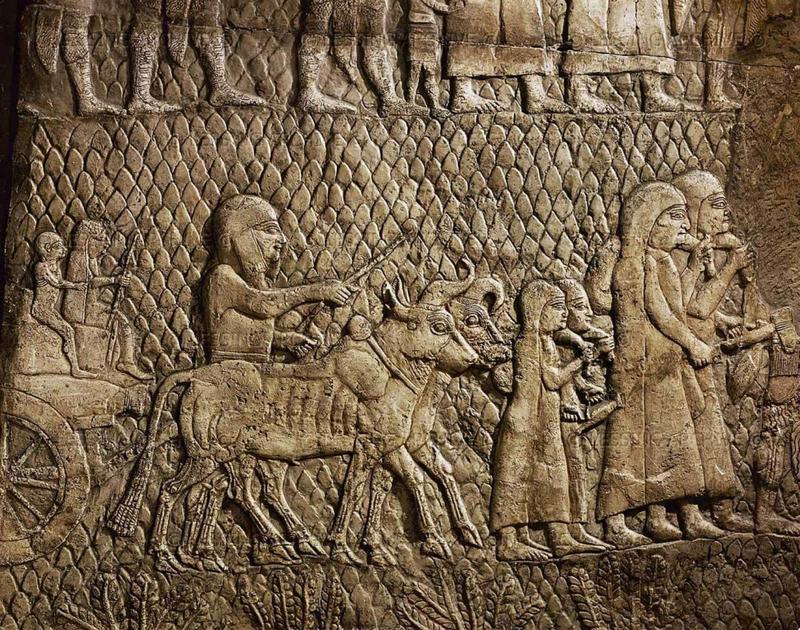Jews By the Rivers of Babylon
Jews By the Rivers of Babylon
In the 6th-century BC, the armies of Babylon destroyed Jerusalem and the Kingdom of Judah. They tore down the town walls, burnt the temples, and ran down every person who attempted to escape. The few survivors were dragged from the homeland and made to reside in Babylon as vassals to the men who butchered their kids.
And when the Jews in exile acquired their liberty, the majority of them did not leave. They remained in Babylon – and maintained a thriving community which lasted for at least 2,000 years.
It is one of the stranger moments in history. These people were brutalized by an invading army. They had been taught to hate so viciously that, for centuries, the word”Babylon”, to the Jews, was synonymous with evil. However, most chose to remain right there with their captors, residing side-by-side with the men who had made their lives miserable.
Why did not they leave? It is a question that has plagued historians and theologians alike; however some recently discovered documents shed a little light on how Babylon created a Jewish community which still lives on today.
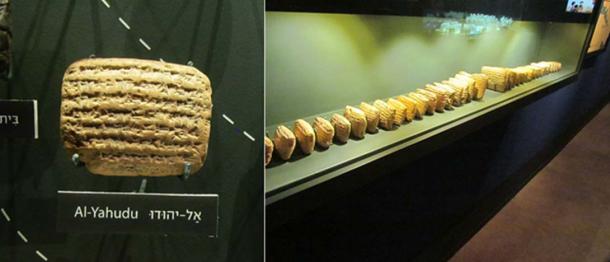
The Al-Yahudu tablets are a set of approximately 200 clay tablets from the sixth and fifth centuries BC documenting the exiled Judean community in Babylonia. ( CC BY-SA 4.0 )
More Than Just A Bible Story
We are not just talking about a story . Without doubt, this happened. The Babylonians left records of the war with Judah too, and their variant backs up fairly well everything the Israelites said.
Even the side of the story does not paint them in a much better light. This was a war from a different age. The only explanation the Babylonians gave for destroying an entire nation has been, in their words, there was “much plunder” and “heavy tribute” to be won from massacring an whole nation of people.
Their conquests were brutal. Nebuchadnezzar II, the Babylonian King, entirely devastated the cities he conquered. He boasted, after beating Egypt, that “not a single man escaped” his onslaught, and the archaeological evidence shows he was not exaggerating. Based on the ruins he left , he left the countries he defeated completely barren. The natives were dragged to his country, and the scorched earth that had been their home was left empty and desolate.
The Israelites did not have any motive to forgive their attackers. They had not provoked them, they had only been plundered and massacred for profit. And still, they learned to live with them.
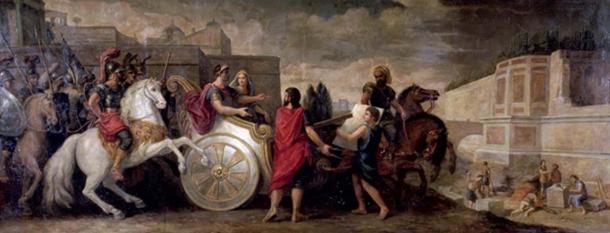
René-Antoine Houasse’s 1676 painting Nebuchadnezzar Ordering the construction of the Hanging Gardens of Babylon. ( Public Domain )
Al-Yahudu: Babylon’s “Judahtown”
Countless Jews were pulled from their homes and made to live in Babylon. They were littered all across the country, pushed to dozens of different communities throughout the kingdom. Of them all, however, the one we know best in a city named Al-Yahudu – or, as it would be roughly translated:” Judahtown”.
Judahtown could have been similar to a contemporary Chinatown, or maybe like a Jewish community in 19th century New York. Babylonians lived there, and they were generally in control, but the location was filled with Jewish expats.
The Jews, however, were not slaves. Aside from the limitation that they could not leave Babylon, they shared the very same rights as their rulers. They could own land, they might build up wealth, and, if they did well enough, they might even be made royal officials.
They have been permitted to maintain their culture, as well. They had a booming neighborhood which communicated in Babylonian’s Akkadian. They kept their faith alive; many gave their children names that started with the letters”Ya” as a reference to”Yahweh”, and the Babylonians did nothing to dissuade them.
It is difficult to wrap your mind around, but the Babylonians had a different sense of morality compared to ours. They may have been conquerors and they have been killers, but if the battle was finished, they were not cruel. They treated their new captives like honored guests.
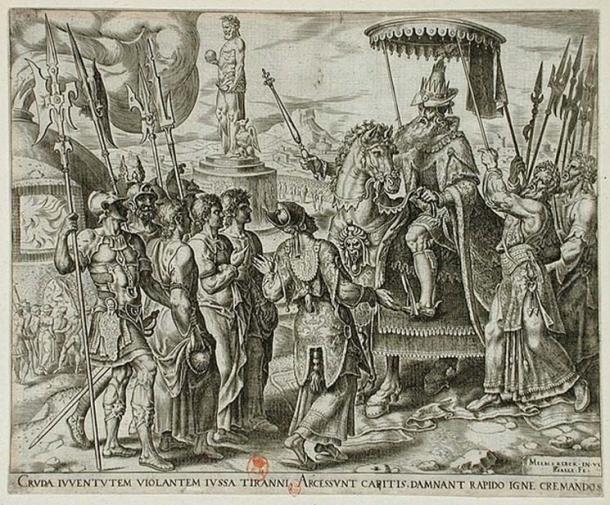
The Three Jews Brought before Nebuchadnezzar by Philip Galle, Holland 1565. ( Public Domain )
Special Treatment
If anything, the Jews were treated better than many. The majority of the states that Babylon conquered were badly crushed that they left no signs of life for ages. The only people who seemed to continue to reside in their homelands and trade with their neighbors were the Jews from the northern Judah state of Benjamin. For whatever reason, they seem to have been permitted to remain in their homeland following the invasion.
King Jehoiachin, the king of Judah, was given a seat of honor in Babylon and supplied with yearly stipend of grain and oil. Cuneiform tablets discovered in Babylon reveal that Nebuchadnezzar made certain he was awarded oil and barley straight from the royal storehouses, and even supplied for Jehoiachin’s family and his men.
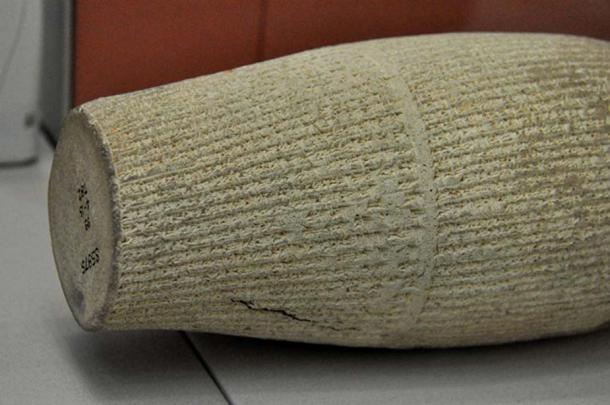
Detail of a terracotta cylinder of Nebuchadnezzar II, documenting the construction and renovation works in Babylon. 604–562 BC. From Babylon, Iraq, housed at the British Museum. ( CC BY-SA 4.0 )
A number of Jews residing as expats got wealthy. Archaeologists have discovered tablets listing land contracts, purchases, and other dry little administrative details which hint at some extraordinary stories. In a couple of years of being defeated, some of the Jews residing in Babylon had earned enough to purchase huge tracts of lands or to be counted among the elite.
Some climbed so high that they were counted one of the most powerful people in Babylon. There are records of Jews in Babylon who functioned as royal merchants, courtiers, and sometimes even officials in direct service to the king.
The 80,000 Who Stayed
That does not mean that each and every Jew in Babylon was living in paradise. Most were poor; typically, they were farmers who struggled to feed their households through heavy taxes in the country. In Babylon, however they had opportunity. They had a method of climbing to the top, even though most did not make it.
Maybe that’s the reason why they stayed. About sixty years following the Babylonian exile began, the Jews were freed. The Persian Empire defeated Babylon and allowed the Jews to return to the home country. Around 40,000 people took the offer and went home – but another 80,000 remained behind in Babylon.
So many people made a decision to remain the Jews living in Babylon became one of the largest diasporic communities on Earth. Within sixty years, they had learned to live with their conquerors comfortably enough that did not wish to leave, though the Persians were ready to provide them a small fortune to take home.
And that neighborhood lived on for thousands of years. In 1950, once the nation of Israel was founded, there were Jews living in the Middle-East, descended from Babylonian communities like Al-Yahudu.
Maybe, after sixty years in captivity, it was simply too hard to return. After sixty years by the rivers of Babylon, they forgot Jerusalem. The majority of them assimilated so completely into their new lives which they could not imagine ever living anywhere else.
References:
“ABC 5 (Jerusalem Chronicle)”. Livius.org. July 26, 2017. Accessible at: http://www.livius.org/sources/content/mesopotamian-chronicles-content/abc-5-jerusalem-chronicle/
“Archaeology in Israel: 2,500-Year-Old Jewish Babylonian Tablets Found in Iraq”. Jewish Virtual Library. February 2015. Accessible at: http://www.jewishvirtuallibrary.org/2-500-year-old-jewish-babylonian-tablets
Baker, Luke. “Ancient Tablets Reveal Life of Jews in Nebuchadnezzar’s Babylon”. Reuters. February 3, 2015. Accessible at: https://www.reuters.com/article/us-israel-archaeology-babylon/ancient-tablets-reveal-life-of-jews-in-nebuchadnezzars-babylon-idUSKBN0L71EK20150203
“How Bad Was the Babylonian Exile?” Bible History Daily. Biblical Archaeology Society. April 15, 2017. Accessible at: https://www.biblicalarchaeology.org/daily/ancient-cultures/ancient-near-eastern-world/how-bad-was-the-babylonian-exile/
Price, J. Randall, and H. Wayne House. Zondervan Handbook of Biblical Archaeology. H. Wayne House, 2017.
Stern, Ephraim. “The Babylonian Gap.” Center for Online Judaic Studies. Nov. 2000. Accessible at: http://cojs.org/the_babylonian_gap-_ephraim_stern-_bar_26-06-_nov-dec_2000/
Waerzeggars, Caroline. “Review Article: Laurie E. Pearce and Cornelia Wunsch, Documents of
Judean Exiles and West Semites in Babylonia in the Collection of David Sofer”. Strata: Bulletin of the Anglo-Israel Archaeological Society. 2015. Accessible at: http://cuneiform.library.cornell.edu/sites/default/files/Waerzeggars-Strata%202015-v33.pdf
Be the first to post a message!
